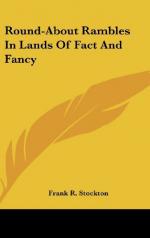There is no doubt, if we were to treat our horses with gentleness and prudence, and in a measure make companions of them whenever it was possible, that they would come to regard us with much of the affection and obedience which the Arabian horse shows to his master.
INDIAN PUDDINGS: PUMPKIN PIES.
[Illustration]
Some of the good old folks whom I well remember, called these things “Ingin-puddins and punkin pies,” but now we all know what very incorrect expressions those were. Rut, even with such highly improper names, these delicacies tasted quite—as well in those days as they do now, and, if my youthful memory does not mislead me, they tasted a little better.
There is no stage of the rise and progress of Indian puddings and pumpkin pies, with which, when a youngster, I was not familiar. In the very beginning of things, when the fields were being ploughed, “we boys” were there. True, we went with no intent to benefit either the corn-crop or the pumpkin-vines. We merely searched in the newly turned-up earth for fish-worms. But for all that, we were there.
And when the corn was all planted, how zealous we used to be about the crows! What benevolent but idiotic old scarecrows we used to construct, and how extremely anxious we were to be intrusted with guns, that we might disperse, at once and forever, these black marauders! For well we knew that a few dead crows, stuck up here and there on stakes, would frighten away all the rest of the flock.
But we were not allowed the guns, and, even if we had had them, it is probable that the crows would all have died of old age, had they depended for an early death upon our powder and shot. With their sagacity, their long sight, and their sentinels posted on the high trees around the field, they were not likely to let a boy with a gun approach very near to them. I have heard—and have no doubt of the truth of the statement—that one of the best ways to shoot crows is to go after them in a wagon, keeping your gun, of course, as much out of sight as possible. Crows seem to know exactly what guns are intended for. But they are seldom afraid of a wagon. They expect no danger from it, and one can frequently drive along a country road while crows are quietly feeding in the field adjoining, quite close to the fence.
But if any one goes out to shoot crows in this way he had better be very careful that he has an excessively mild and unimpressible horse. For, if the horse is frightened at the report of the gun, and dashes away, and smashes the wagon, and breaks his harness, and spills everything out of the wagon into the dust, mud, and bramble-bushes, and throws the gunner heels over head into a ditch, it may be that a dead crow will hardly pay him for his trouble and expense in procuring it.
But after a time the corn got so high that it was not afraid of a bird, and then we forgot the crows. But we liked to watch the corn in all its stages. We kept a sharp look-out for the young pumpkin-vines, and were glad to see the beans, which were planted in the hills with the corn in some parts of the field.




